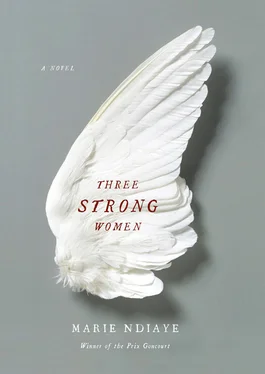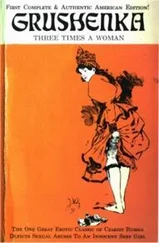So that, when she found herself living with in-laws who couldn’t forgive her for having no means of support and no dowry, who despised her openly and angrily for having failed to conceive, she willingly became a poor, self-effacing wretch who entertained only vague impersonal thoughts and inconsistent, pallid dreams, in the shadow of which she wandered about vacantly, mechanically, dragging her indifferent feet and, she believed, hardly suffering at all.
She lived in a three-room rundown house with her husband’s parents, two of her sisters-in-law, and the young children of one of them.
Behind the house there was a backyard of beaten earth shared with the neighbors.
Khady avoided going into the yard because she feared being peppered with sarcastic comments about her worthlessness and the absurdity of her existence as a penniless, childless widow, and when she had to go there to peel the vegetables or prepare the fish she huddled so closely inside her batik, with only her quick hands and high cheekbones showing, that people soon stopped paying her any attention and forgot all about her, as if this silent, uninteresting heap no longer merited a rude or jeering remark.
Without pausing in her work she would slide into a kind of mental stupor that stopped her taking in what was going on around her.
She then felt almost happy.
She seemed to be in a blank, light sleep that was devoid of both joy and anguish.
Early every morning she would leave the house with her sisters-in-law. All three carried on their heads the plastic bowls of various sizes that they would sell in the market.
There they found their usual spot. Khady would squat a little to one side of the two others, who pretended not to notice her presence, and, responding with three or four raised fingers when asked the price of the bowls, she stayed there for hours on end, motionless in the noisy bustle of the market, which made her slightly dizzy and lulled her back into a state of torpor shot through with pleasing, unthreatening, pallid dreams like long veils flapping in the wind, on which there appeared from time to time the blurred face of her husband smiling his everlasting kindly smile, or, less often, the features of the grandmother who’d brought her up and sheltered her and who had been able to see, even while treating her harshly, that she was a special little girl with her own attributes and not any old child.
So much so that she’d always been conscious of her uniqueness and aware, in a manner that could neither be proved nor disproved, that she, Khady Demba, was strictly irreplaceable, even though her parents had abandoned her and her grandmother had only taken her in because there hadn’t been a choice, and even though no being on earth needed her or wanted her around.
She was happy to be Khady, there’d never been a chink of doubt between herself and the implacable reality of the person called Khady Demba.
She’d even happened on occasion to feel proud of being Khady because — she’d often thought with some amazement — children whose lives seemed happy, who every day got generous helpings of chicken or fish and wore clothes to school that weren’t stained or torn, such children were no more human than Khady Demba, who only managed to get a minuscule helping of the good things in life.
That now was still something she never doubted: that she was indivisible and precious and could only ever be herself.
She just felt tired of existence and weary of all the humiliation she had to undergo, even if it didn’t cause her any real pain.
All the time they were sitting together at their stall her husband’s sisters never once spoke to her.
On the way back from the market they were still quivering with pleasure, as if all the feverish, impassioned hubbub of the crowd still filled them with excitement and they had to shake it off before getting home, and still they never stopped needling, shoving, and pinching Khady, irritated and titillated by the impregnable firmness of her body, the cold scowl on her face, knowing or surmising that she would blot everything out as soon as they began tormenting her, knowing or surmising that the most cutting remarks were transformed in her mind into reddish veils, which started to get entangled a bit, if fleetingly, with the others, her pallid beneficent dreams — knowing it, surmising it, and feeling silently irritated by it.
Khady sometimes stepped quickly aside or began walking at a dauntingly slow pace, and the two sisters soon started losing interest in her.
On one occasion, one of them shouted, “What’s the matter, you a mute?” when she turned around and noticed the lengthening distance between themselves and Khady.
Khady couldn’t prevent her mind from taking that in. The expression surprised her by revealing what, without realizing it, she already knew: that she hadn’t opened her mouth in quite a long while.
The chattering in her dreams, made up vaguely of the voice of her husband, her own, and that of a few nameless people from the past, had given her the impression that she had been speaking from time to time.
She was seized with a sudden panic: if she forgot how words were formed and uttered, could she count on having a future, even a tiresome one?
She sank back into numb indifference.
But she made no effort to say anything, fearing that she mightn’t succeed and that a strange, disturbing sound would reach her ears.
When her in-laws — backed up by their two daughters, who, for once, were content to listen in silence — told Khady she had to go, they didn’t expect her to reply, because they weren’t asking her a question but giving her an order, and, although her apathy was now being tempered by anxiety, Khady said nothing, asked nothing, believing perhaps that by her silence she avoided the risk of their intentions concerning her person acquiring greater precision, of her departure becoming a reality, as if, she would later tell herself, her husband’s parents had the slightest need to hear their words answered by any words of hers in order to be assured of the reality and validity of what they were proposing.
No, they had no need to hear anything she might have to say, none whatever. Khady knew that for them she simply did not exist.
Because their only son had married her against their wishes, because she had not produced a child, and because she enjoyed no one’s protection, they had tacitly, naturally, without animus or ulterior motive, separated her from the human community, and so their hard, narrow, old people’s eyes made no distinction between the shape called Khady and the innumerable forms of animals and things that also inhabit the world.
Khady knew they were wrong, but she had no way of telling them so other than by being there and looking obviously like them. But she knew that would not be enough, and she’d ceased concerning herself with proving to them that she was human.
So she listened in silence, focusing on the patterned skirts worn by her two sisters-in-law sitting on each side of their parents on the old sofa, their hands lying palms up on their thighs, with a guileless fragility that wasn’t in the women’s nature but that all of a sudden presaged their death — which unveiled and prefigured the innocent vulnerability of their faces when they would be dead — and those defenseless hands were so similar to those of her husband, their brother, after his life had suddenly left him that Khady felt a lump in her throat.
Her mother-in-law’s voice — dry, monotonous, threatening — was still spelling out what must have been, Khady thought distantly, a number of disagreeable recommendations, but she was no longer making any effort to understand.
She barely heard about someone called Fanta, a cousin who’d married a white man and was now living in France.
Читать дальше












